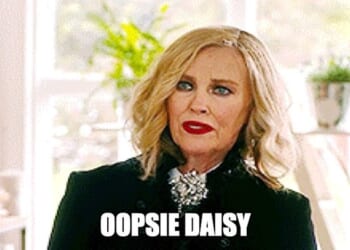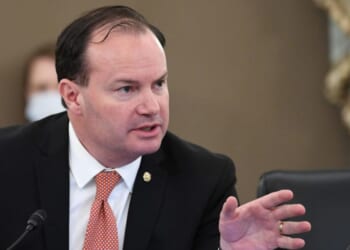Danny Kruger is MP for East Wiltshire and a former Political Secretary to Boris Johnson when Prime Minister.
Two moments stick in my memory from the Assisted Suicide Bill committee, which I sat through with two dozen colleages for six long weeks earlier this year.
The first is when Kim Leadbeater MP – after repeated pressing – confirmed that under her Bill someone could get an ‘assisted death’ for no other reason than feeling a burden on others. Later, Kim and her hand-picked committee rejected an amendment that would require the doctor to ask the simple question to the patient requesting assisted suicide: ‘why?’
This admission goes to the heart of the danger of this Bill.
We can all understand the benefit it could bring to people at the very end of their lives to avoid a terrible final few days (albeit the number of patients that good palliative care – or in extremis, deep sedation – cannot help is close to zero). But this Bill would offer state-administered suicide to anyone with a condition they might reasonably die of within six months (that’s a lot of disabled and frail people) who feel they’d be better off dead.
It sends a clear signal to those people – it effectively requires them to consider – that the right thing to do may be to accept the offered service.
The second memorable moment was when Kim introduced an amendment to the Bill giving ministers the power to change the founding principles of the National Health Service itself.
This amendment (like the scrapping of the High Court judge, a safeguard much touted during the Second Reading debate) was not introduced when MPs as a whole were voting on the Bill, but only in a committee packed by Kim with a majority of supporters.
It authorises ministers to declare that Section 1 of the Act establishing the NHS, which currently simply says the service is there to secure improvement in the health of the people, now includes the power to end life. And thus the NHS becomes the National Health and Suicide Assistance Service.
The Bill would institutionalise a profound change in our society and alter the basis of the NHS. And the detail is no less distressing.
It would allow doctors to raise Assisted Suicide (AS) with patients who hadn’t raised it themselves; it would allow them suggest it to children. It requires no specialist assessment of the patient’s condition, or mental state, before approval by doctors. The only input from a psychiatrist comes at the end, after approval, when a panel of experts simply confirms the process has been properly followed.
This panel can approve a death, and then the death happens.
If it declines, a new czar, the Assisted Death Commissioner, can overturn the decision, and then the death happens. There is no appeal against approvals.
The panel is not required to ask questions of the approving doctors, nor to meet the patient, let alone to hear from their family or others who may fear coercion or issues with mental capacity. Indeed there is no provision for your family to even know you are going through the process; the first they may hear – if anyone tells them – is that the deed is done, and please collect the body.
The mental capacity test is notoriously easy to pass. There is nothing to stop someone with depression or anorexia being approved for assisted suicide, as happens in other countries where it is legal.
As for coercion, not only does the proposed regime not have adequate safeguards against abusive partners or family members pressuring someone to die, but it lacks any recognition of the danger of ‘internal’ coercion, the sense that the right thing to do is to save others the expense and distress of caring for you.
I oppose Assisted Suicide for practical reasons.
I don’t think any AS regime could ever protect the vulnerable from the cultural changes which are already at work in our society and which it would accelerate: indifference or contempt for older and disabled people; domestic abuse; a culture that sees people’s value in their utility and cost, rather than in their intrinsic humanity.
But even if you support AS this Bill is the wrong one.
It is too wide in its eligibility; the process of pushing it through Parliament has been chaotic, bordering on anti-democratic; it will have a severely detrimental effect on the NHS.
If we’re to do this, let’s draw the terms of access much more tightly; do it outside the NHS; and most of all, have a proper public consultation on end-of-life care and a proper plan to boost palliative care services before AS is ever legal.




![‘It’s a Recipe for a Hundred Years of National Dominance’: Stephen Miller [WATCH]](https://www.right2024.com/wp-content/uploads/2025/05/Stephen-Miller-Completely-Obliterates-CNN-Host-Over-Her-Illegal-Immigration-350x250.jpg)
![Trump Posts Hilarious Pope Meme, Leftists Immediately Melt Down [WATCH]](https://www.right2024.com/wp-content/uploads/2025/05/Trump-Posts-Hilarious-Pope-Meme-Leftists-Immediately-Melt-Down-WATCH-350x250.jpg)

![Wild Road Rage Brawl Erupts in Milwaukee [WATCH]](https://www.right2024.com/wp-content/uploads/2025/05/Road-Rage-Turns-Violent-in-Oregon-Minivan-Mows-Down-Motorcyclist-350x250.jpg)


![Karoline Leavitt Calls for Jill Biden to Answer for Joe's Cognitive Decline Cover-Up [WATCH]](https://www.right2024.com/wp-content/uploads/2025/05/Karoline-Leavitt-Calls-for-Jill-Biden-to-Answer-for-Joes-350x250.jpg)
![Bessent Exposes Media Lies About April’s Stock Market Performance [WATCH]](https://www.right2024.com/wp-content/uploads/2025/04/Bessent-Exposes-Media-Lies-About-Aprils-Stock-Market-Performance-WATCH-350x250.jpg)





